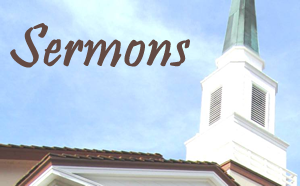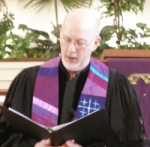 A sermon preached by Rev. Dr. Randle R. (Rick) Mixon
A sermon preached by Rev. Dr. Randle R. (Rick) Mixon
First Baptist Church, Palo Alto, CA
Sunday, April 10, 2016
Text: Genesis 1 Genesis 1: Beginningness Paraphrase by Timothy Wayne Good
Before the beginning of time was the eternal God. Our beginning was God’s creation of space and a nascent mass we would someday call home. The earth was an assemblage of primordial solids, liquids, gases and plasmas still without form; still unlit. God’s Spirit moved across its face as God said: “Here is light. So be it.” The light’s embracing and warming of the cold dark world pleased God. God spun the planet to separate the hours into days and nights. The first day came to a close.
The next day, God separated the waters above and below: “So be it.” God called the moisture above “sky”, and the sunset and dawn of the second day in this primeval atmosphere created a global rainbow.
On the third day, God next separated the solid particles from water below to create land and sea. “So be it” God said, and it was pleasing. But land needs roots to bind it together and make it alive, so God caused plants of all kinds to spring forth from the once sterile ground. Fertile soil was created. “So be it.” God was pleased as another evening and morning brought an end to the third day.
On the fourth, God separated the nebulous glow of light by allowing celestial bodies to shine through the clearing atmosphere. It was as it was willed. The cosmos danced across the heavens, and the sun and the moon raced. God was pleased.
The next day, God made the waters below and above alive with new life: leviathans; bugs; whales; bats; birds; and fish. They all pleased God, and God blessed them with the fruitfulness of ongoing creation. Evening passed and then the dawn; fifth day done.
God continued populating the planet by introducing land animals into the green paradise; and it pleased God. God said: “This next creature I will make in My own image with My own essence so that it may be able to rule over my earthly kingdom with wisdom and compassion.” So God formed humanity in all its many visages in God’s image, in the image of God made them all; God made them like Godself, male and female. God blessed them, too, with fruitfulness, and gave them responsibility for the care of creation. “See,” God said, “I’ve given you everything you need to thrive, and abundance to sustain you and give you joy.”
God looked at the intricate relatedness of each of the worlds God created. We too see the intricate intimacies of life on earth – the chains, webs and circles of mutualism and dependence. God was pleased with His work; it was bustling, teeming, complete and whole – perfect. So God finished and took the final day off. God blessed this seventh day and made it a holy day to enjoy creation and to remember the Creator.
These are the generations of God’s creation of all.
(Timothy Wayne Good, “Beginningness,” June 15, 2011, thenakedalien.blogspot.com)
Interconnection is not a particularly pretty word. It doesn’t really roll off the tongue. It’s difficult to imagine a poet using it to shape a phrase or complete a rhyme. Nor has it been a common concept in theological work, though we may find it moreso with the “greening” of theology. What today’s text teaches us is that God has carefully and lovingly interwoven the elements of creation into a grand and sacred whole, an entity that God shapes and calls “good.” There is much to explore, to understand, to embrace, to enjoy and, yes, to love in the intricate interconnectedness of creation.
For God’s own reasons and purposes, She sings out, “Come together!” And from every atomic particle, from the “primordial solids, gases and plasmas still without form,” God begins to create. Or, in the words of James Weldon Johnson (from “The Creation” in God’s Trombones),
AND God stepped out on space,
And He looked around and said,
“I’m lonely—
I’ll make me a world.”
To show off, to cure loneliness, for the sheer delight of it all, just because She could, God sang out, “Come together!” Things began to coalesce all around her and universe upon universe came into being. All that came into being was interconnected in and through the Creator, who saw it and said it was “good.”
When we talked about this creation story in Bible Study, I said it sounded to me as if God created from a sort of “roiling cauldron of stuff” rather than from nothing. As is often the case, Alan raised the challenging question, “But where did the ‘stuff’ come from, if God didn’t create it?” Of course, it’s a good question. The best response my little mind could come up with is that it pre-existed along with God. In actuality, it may be part of God, inextricably interconnected with the Holy One. To the degree we can visualize infinity, God and the “stuff” of God have always existed and always will. Alright, my head is starting to hurt. As we sometimes like to affirm, God is always the ”More.”
In a blog entitled, “The ‘Not-nothingess’ of Space,” Russ Dean writes, “I was surprised when I learned that outer space wasn’t made up of nothing. ‘What do you mean, it’s not ‘nothing’ out there? What’s out there?’” he asked. “I wasn’t talking about stars and planets, moons and asteroids, but about all the nothingness of space between them. I was told that that’s not nothing, either.” With the recent observation of “gravitational waves,” Russ says, “it reminds us that across the sea of whirling galaxies, the energy and the matter, the space and the time are really the same stuff, and the quarks and the stars, the waves and the wind — even the ‘red and yellow, black and white’ — are all part of One grand and unifying Spirit” (Russ Dean, “The ‘Not-nothingess’ of Space,” 4-4-2016, baptistnews.com). One grand and unifying Spirit that we call God, the One in whom we live and move have our being. Interconnection!
A couple of other things we considered as we studied this ancient word is how compatible it is with other current scientific thought. Now don’t get me wrong. I am not in any way suggesting that Genesis is or was ever meant to be a scientific text, but read it carefully and see if you don’t hear echoes of evolution in its poetry. And then, Alan, again, suggested that that first act of creation, that sudden separation of light from dark sounded a lot like the “big bang” theory. God sang out and suddenly, “boom,” things started to happen.
Part of the genius of this ancient explanatory myth is the way in which God carefully crafts each element and then gives it its appropriate place in a magnificent whole. To each lovingly shaped dimension of creation, She sings, “Come together!” and then she delights in the intricate beauty of her handiwork – “oh, that’s good.” In today’s Words of Preparation, Elizabeth Johnson writes, “Woven into our lives is the very fire from the stars and genes from the sea creatures, and everyone, utterly everyone, is kin in the radiant tapestry of being” (Elizabeth A. Johnson, Women, Earth, and Creator Spirit). Interconnection!
Dan and Afan and I are in the midst of a set of concerts with The Choral Project, so you can imagine that singing in the choir has been on my mind this week. As I thought about today’s theme, it struck me that choirs and choral music are wonderful images for coming together and interconnection. In fact, a choir is interconnection by definition. If we practice long enough and hard enough we may create something of great beauty, infused by one great and unifying spirit.
But here’s the thing, you might not appreciate immediately all the different sounds the choir makes. This wondrous entity that is the music may sound strange to your ear or be alien to your experience. Our choir sings a lot of contemporary classical music, which is not to everyone’s taste. Sometimes you may have to work to understand, if not embrace, the genius of the composer.
Let me give you a couple of examples. Johann Sebastian Bach wrote a beautiful chorale that sounds like this. [Jan plays on the organ.] He wrote this almost 300 years ago. In the 20th century, a fine Norwegian composer, Knut Nystedt, took this excerpt from the chorale and re-arranged it as a tribute to Bach’s genius. In his version, entitled, “Immortal Bach,” Nystedt divides the choir into five smaller choirs. Each small choir, in turn, sings the excerpt from the chorale, only each choir sings it at a different tempo. Now you might imagine that sounds like cacophony or chaos, and, frankly, to me it does, but Nystedt, the creator, heard something in that configuration that shaped the old elements of the chorale into a new sound, one that may come close to capturing the music of the spheres, which often sound beyond our easy listening.
Or as another example, we sing some music in which the choir divides into six or eight or twelve or sixteen parts. In this music, each part may sing its own note, creating a “sound cluster.” [Jan plays.] Again, you may not find the sound exactly beautiful, but in the context of a given work of music, this cluster may be a powerful way for the individual elements of the choir to come together in a new and exciting way. It is challenging to sing and challenging to hear but it also invites us to join with the creator who is constantly creating and drawing us into new and exciting configurations. Interconnection!
As we celebrate this earth month and beyond, we are likely to come up against ideas and images that are not easy to see or hear or necessarily to our liking. We can argue about the details of science and technology until the cows come home or the sun burns out. But there is a theological and spiritual underpinning for our conversation in the recognition of the interconnectedness of creation. It is all God’s doing. And God has blessed it and called it good. As God called creation to come together, the same God calls us to come together in appreciation, in love and care for what God has brought in to being. It is both a responsibility and great gift that calls us into a co-creative process of stewardship of creation. We may find it difficult at times to see with God’s eyes, to hear with God’s ears, to feel with God’s heart, or to reason with God’s mind, which is why we need to come together – to hear the beauty in the tone cluster, to admire the creative genius of gravitational waves, to discover the web-like intricacies that make up the earth, and to wonder at the constant shaping and re-shaping of creation.
“’See,’ God said, ‘I’ve given you everything you need to thrive, and abundance to sustain you and give you joy.’” Then, “God looked at the intricate relatedness of each of the worlds God created. We too see the intricate intimacies of life on earth – the chains, webs and circles of mutualism and dependence. God was pleased with this work; it was bustling, teeming, complete and whole – perfect.” And God sang out, “Come together! See how good it is. Share with me the delight of its existence and the joy of caring for it all.” Interconnection! Amen.






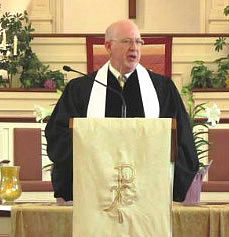




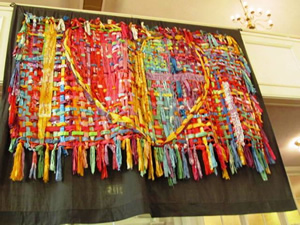

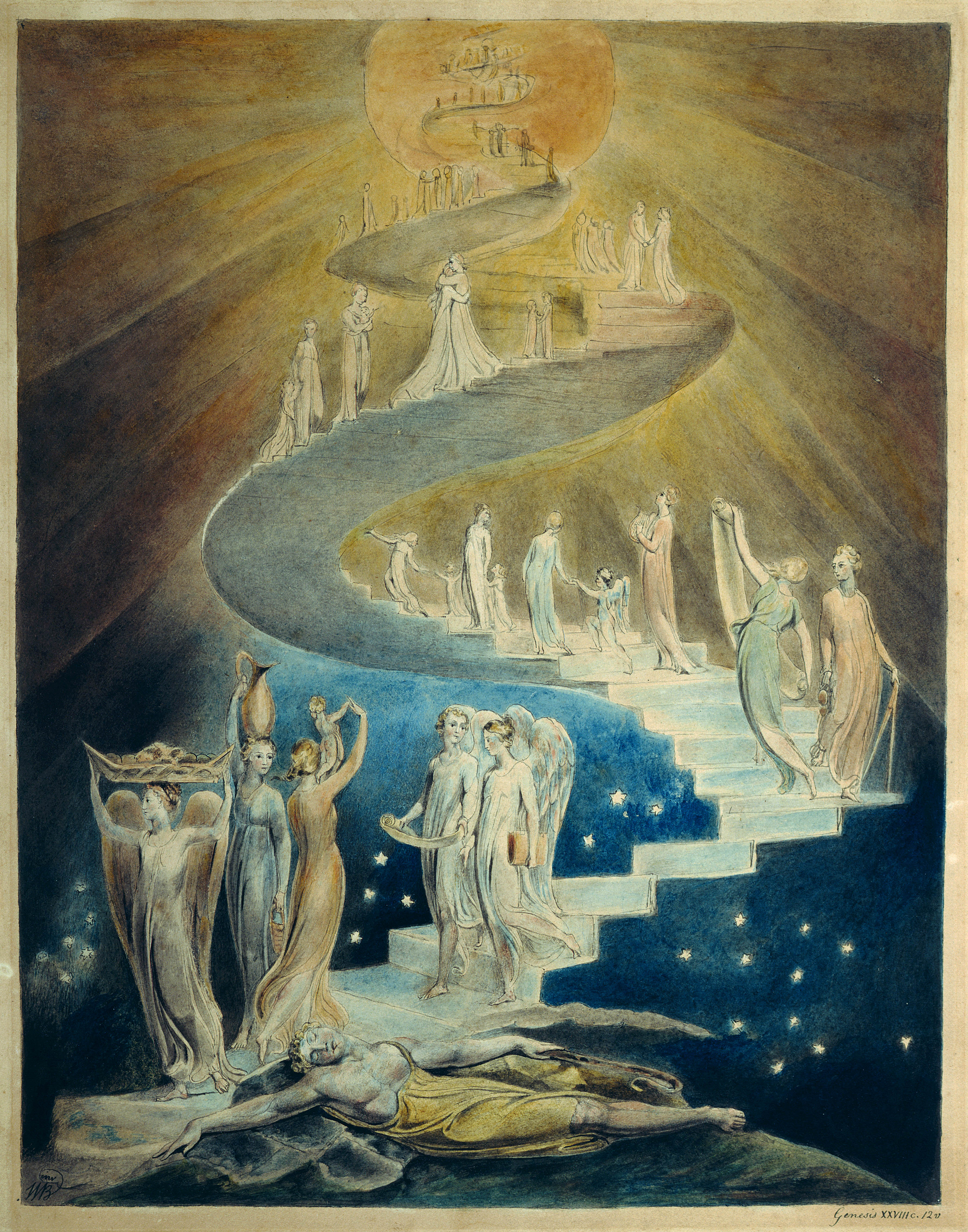 A sermon preached by Rev. Dr. Randle R. (Rick) Mixon
A sermon preached by Rev. Dr. Randle R. (Rick) Mixon